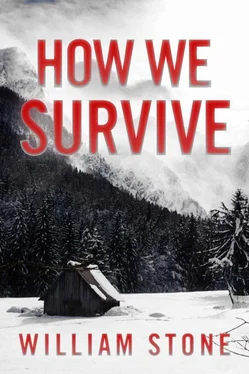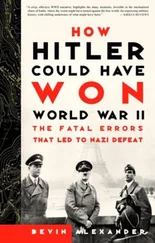William Stone
HOW WE SURVIVE
The day started out like any other. The welding shop was empty, nobody there yet but Hatfield. Coming early to work wasn’t something he enjoyed. It was the price he had to pay for being so good at his job. More skill, more responsibility. That meant less sleep.
Strapping on his leather apron, he gazed out of the doorway as his boss stepped in from the parking lot with a young guy he didn’t recognize strutting beside him. Please say this isn’t a new guy, Hatfield thought to himself. New guys were a pain, not to mention a danger. Welding wasn’t a place for somebody who didn’t know how to handle an electric ARC machine—especially those who didn’t have the patience to properly learn.
“Hatfield! Happy to see you, friend!” Brian called. “Like my daddy used to say, if you’re not ten minutes early, you’re late.”
For as long as he’d known him, Brian had always had the demeanor of a salesman after too many cups of coffee. A little phony at times, but never lacking in enthusiasm.
“Morning, Brian,” he grunted, still waking up.
“Todd, I want you to meet Trevor Hatfield. He’s the very best we have here.”
They shook, Hatfield caught off-guard by the kid’s muscled grip.
“He’s the best for now,” Todd said, face slanted by a smirk. “Give me a month, and he’ll be the second-best.”
Brian shook his head, chuckled. “Todd’s a little more experienced than most new guys we get. He’s done his share of soldering.”
“Really? What shop?” Hatfield asked.
“No, I wasn’t working in a shop. Just in class. I majored in industrial mechanics in college.”
Hatfield nodded, a polite smile on his lips. But inside, he thought, new guy, college kid. Fasten your seat belts.
“I’ll leave you guys to it then!” Brian said, heading to his office.
“Cool,” Todd said. “Just lead me to the ARC machine, and I’m ready to get started.”
“Let’s slow down,” Hatfield said. “First, let me know what safety rule number one is.”
The kid rolled his eyes. “Always wear protective clothing,” he groaned. “Yes, I get that the machine is hot.”
“Before we get to the clothing, what do we make sure of?”
“I don’t know.”
“Rule number one. You don’t weld alone. Ever. We work on the buddy system. At least two people in the shop at all times.”
“What if you know what you’re doing?”
“I’m sure you think you do. But you don’t. Not yet.”
“Sure I do. Ask me anything.”
“Okay, how hot will the ARC machine be?”
“Well, let’s see,” Todd says, gazing at it. “This is mechanized inert gas welding we’re doing, so we’re looking at temperatures upward of twenty-five hundred degrees Celsius.”
Hatfield shook his head. “That’s a good answer for shop class, but here in the shop, the correct answer is far too hot for us to have this lying around.” He lifted a stray piece of paper. “This thing can ignite a spark, which can ignite fires. That is something you do not want.”
“Sorry.”
“In welding, we don’t aim to be sorry. We aim to be careful. Now let’s continue to be careful and get yourself ready to weld.”
“Yes, sir.”
* * *
ONCE THE NEW guy’s lesson was done, Hatfield headed to the break room for lunch, catching Brian in the middle of a spirited conversation, pacing the floor. He was selling some guy his used pickup truck with the fervor of a high school football coach on the cusp of a championship win. His boss cupped the phone and asked, “How’s the new guy working out?”
“A little rusty, of course, but he’s getting there. He’ll be fine.”
“I don’t know,” Brian said. “He seemed a little full of himself to me.”
Hatfield shrugged. “Me too, but we all do when we start. Young kid with a skill that’s in demand, something that shows you know what you’re doing with your hands? You’re cocky. You can’t help it. Ever talk to your dad about me when I first started?”
“No.”
“Good. I could do without the embarrassment.”
Brian gave him a pat on the shoulder, then got back to the phone call.
Hatfield tossed a cheeseburger into the microwave and took a seat at a nearby table. A quick check of his cell phone showed no new messages.
With the cheeseburger five seconds away from completion, the microwave stopped. Everything in the break room went dark. The lights, his cell phone, the radio leaking out of the office behind the break room.
“Holy cow!” Brian yelled. “Bet you it’s the new guy’s fault! I had a feeling about that arrogant son of a gun.”
A collective groan floated from the shop floor. Hatfield left the break room and checked it out. “Looks like we got a little paid break, right, Brian?” one of the guys called from the shop floor.
The line got a laugh from all eight guys, most of them casually taking off their masks and having a seat.
These paid breaks happened roughly three or four times a year. With all that power firing up at once, outages were just another thing that happened at the shop. Nothing to get excited about. But Hatfield suspected there was more going on.
After checking his cell phone, he stepped into the parking lot, peered across the street and noticed things nobody inside seemed to. Traffic lights had gone out. Cars were stranded in the middle of the road. People scrambling around, desperate, confused, angry.
Hatfield wasn’t confused at all. After all those conversations with his dad about what to do if the worst happened, there was little doubt about it. This was the result of an EMP attack.
As a kid, Hatfield never thought of his dad as a source of wisdom. He was overbearing, strict and, at times, cruel. His military background was a big part of that. Sergeant Ernest Hatfield may have been retired from the army, but he was still very much the drill instructor at home.
And there was another factor. He felt the need to drill into his only child on the importance of self-discipline and self-reliance. “You never know when the big attack will come, and if you’re not prepared for it, you’ll be just like everybody else, scrambling around like a hen with a fox loose.”
Early on, he never made clear what he meant by “attack.” His son would ask, but the answer was always vague. The day his dad spelled out the concern for him was one that stayed seared into his memory forever.
The trailer was empty except for young Trevor, with Dad out hunting and Mom at the river hand-washing clothes. He slipped inside to use the phone, careful to take occasional glances out the window to make sure nobody surprised him.
He nervously picked up the phone and dialed, then waited for an answer, his pulse throbbing with fear and anticipation.
“Hello?”
“Hey, Michelle. Guess who?”
“Trevor? My God, how’d you get your parents to allow a phone call?”
“I didn’t. They don’t know I’m on the phone.”
She giggled. “You’re just terrible. It’s like you’re asking to get in trouble.”
“Naw, just miss you, that’s all.”
“So… why exactly did you move again? The whole thing didn’t make sense.”
“It doesn’t make sense to me, either,” he said. “My dad went on this whole thing about how we need to be self-sufficient and live off the land and all that stuff. So here we are.”
“Yeah. Five hundred miles away. Seriously, do you guys even have electricity? Or gas?”
“We have this generator, but let’s put it this way: Everything we have with technology is for emergencies—phone, stove, heating, refrigeration. It’s like camping.”
Читать дальше












